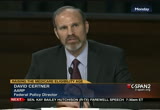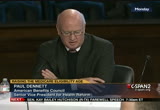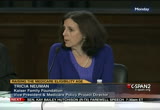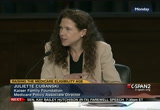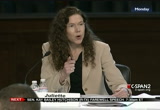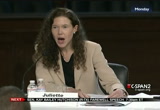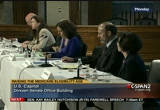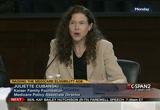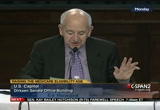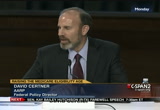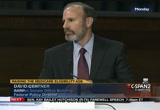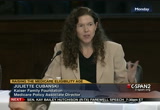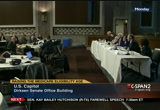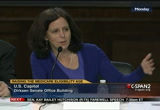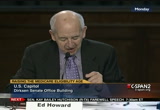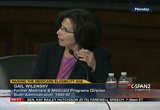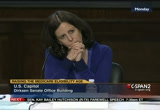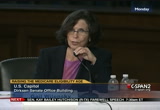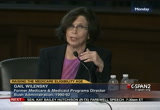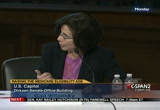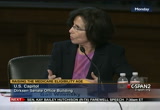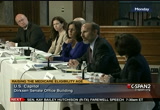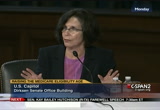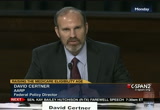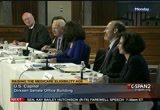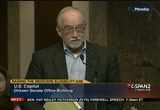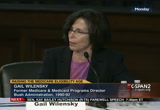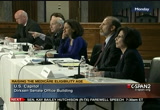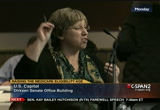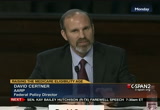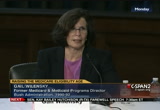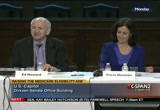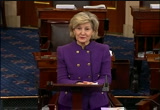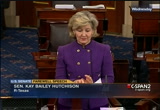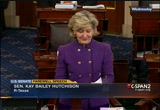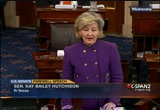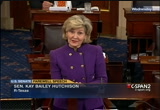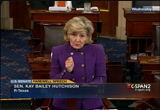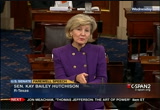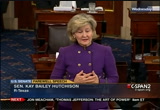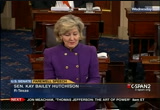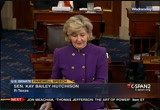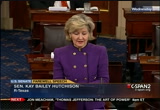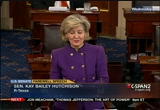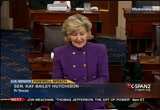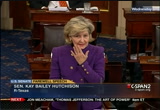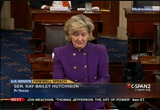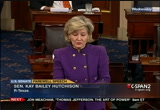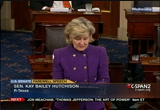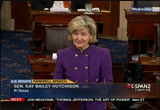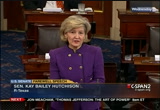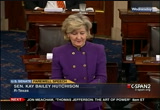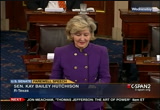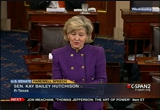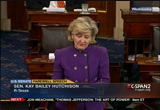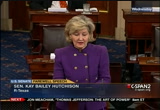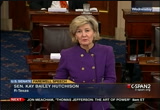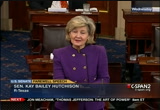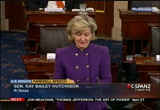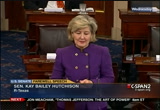tv C-SPAN2 Weekend CSPAN December 22, 2012 7:00am-8:00am EST
7:00 am
you look at increases in longevity you will see a very dramatic difference in increases in longevity between people hiring and people who are lower. significant gains in longevity among higher-income individuals, particularly at the lower end, longevity for the last generation has been very flat. >> you have a comment, paul? >> i went to that of a comments that we have seen a shift for employers valuing older workers, that has definitely been something that i have seen over the past 15 or 20 years too, there is more recognition of the importance of maintaining your talent for logger periods of time and if anything one of the first things a good employer identified as the concern about the availability of subsidized coverage in health insurance exchange is it might encourage workers to they want to remain
7:01 am
in the work force logger to leave sooner than they might otherwise. so i think that is one of the realities and as i started out with my comments, i think one of the big contributions juliette cubanski did with the study, being one of the first to look at the whole world and ask questions, how does this analysis of public policy change once you factor in the enactment of the affordable care act and its implementation in 2014? >> this is a question for juliette cubanski. the kaiser study estimates spending of full medicaid coverage to everybody eligible for medicaid presume that 100% would get coverage. questions both about coverage and cost.
7:02 am
the study is done and we know what is going on in the real world, what are the more likely to affect on coverage and more likely effects on medicaid costs? >> i am going to broaden the question little bit and talk about the effects for all coverage sources. we assumed as i said that everybody who lost eligibility for medicare would take another source of coverage depending on their access to other sources such as employer coverage or their incomes which might qualify them for subsidies for medicaid coverage. first, let's take the question of the individual mandate and premium subsidies in the exchanges. there have been questions raised about what happens if people 65 and 66 don't have medicare can they qualify for these? there is no mention of a specific age for qualification for subsidies or exchange
7:03 am
coverage so presumably if people didn't have access to medicare they could, depending on income, qualified for whenever subsidies they been entitled to. it'd different story for the medicaid expansion. the aca specifically does limit eligibility for the new medicaid coverage to people under 65. presumably there would need to be a statutory change if medicare eligibility age was raised to 67 or even higher, that provision would need to change to enable people to qualify for the medicaid expansion. in states that don't expand medicaid those adults with incomes between 100%, and 138% of poverty would be eligible for subsidies in the exchange and they would be subject to the mandate, but for people with
7:04 am
income below 100% of poverty in states that do not opt for medicaid expansion, they would not be eligible for medicaid or subsidies because the law limits those to people with incomes 100% or above. having spoken to my colleagues at kaiser about this issue who followed this issue more carefully than i have, they said cygnus -- secretary cbs has said these individuals would not be subject to mandate penalties if they lived in a state that did not expand medicaid and selling this coverage gap. >> would they be uninsured? >> presumably that would be -- >> the question really, do we know how many people could potentially be uninsured? >> we don't really have an estimate since we didn't factor this, our analysis was conducted prior to the supreme court for
7:05 am
consideration of the case and the supreme court decision, but i believe there was another analysis done of this issue by the center for american progress. i am not sure which. there have been some recent analyses of this question looking at numbers potentially for those individuals who are living in states that have expressed lack of interest in expanding their medicaid program. >> while i have you at the microphone there are a few other technical questions. 100% federal payment on medicaid because it was implemented in 2014 and some pointed out in effect for the state. explained that. >> state contribution for the new medicaid expansion is initially zero. 100% federal share until 2017 and then goes down to 90% over the next few years so this would
7:06 am
pick up putz -- the effect we found meet spending increases of $0.7 million. not a huge number at least in the year of our analysis but there would be a slightly larger number in later years of this proposal. >> okay. one more for you and we will spread out. why are your numbers different from those in the congressional budget office? >> the cbo did an analysis of eligibility, they also began implementation of higher eligibility age in 2014. they modeled the save approach and proposals and we are more likely to see, their analysis was over ten year budget window and ours was just in a single year of full implementation.
7:07 am
there are differences in the assumptions they made in terms that they assumed 5% of this total population of 65, 66-year-olds would go without insurance where we assumed 100% coverage, and slightly more technical differences and assumptions, but the largest one is the fact that they are looking over a longer period of time and phasing in the proposal. >> we have got a question here. a -- it asserts that several speakers used average amounts of making their calculations, but that significant differences are evident once you analyze different income groups and although this questionnaire would ask this question, we would be interested in hearing from other analysts as well.
7:08 am
since those below median income will be treated differently and i am not sure that is quite right, from the average, policy focused only on those in upper income, that is the question that has been raised by senator durbin who allowed he might be willing to consider a change in eligibility if there was some way of predicting low income people. i would be interested in hearing how folks -- how to deal with that. >> a couple responses. the strength of programs like medicare and social security is based on the fact that there are social insurance programs every but pays into and gets out of. i mentioned earlier how the medicaid program itself is very heavily income related and there are different income features throughout the medicare program,
7:09 am
certain people have their premiums paid through medicaid. if you are in the part d program and third income, you have more of your drug costs for example, people don't know for those people there is no donor hold because they have part b coverage taken care, 65, 16-year-old man loses that coverage should they not be eligible for medicare? there are already number of income adjusted features for the program and of course there will be differences as we just heard, medicaid expansion in some states and not others and a lot of running short because those folks will not be able to afford their insurance. we have a mixed bag of impact here and already a fair amount of income related in the medicare program. >> can i make a point on this? we are talking averages, and we
7:10 am
did look at different income groups in our analysis, granted there is a large span of income when you look at 300% or 200% or 300% and 400% and above is a large group although it is a relatively small share of the medicare population. for those of you who are interested in looking at averages for specific income groups, i didn't present them in my slide because i have a lot of materials present already in the 10 minutes i was allotted. we do cover the different out of pocket changes in terms of premiums people would have paid under medicare and costs under medicare and they're expected premium and cost sharing obligations under medicaid or exchange coverage and all of those results are described in more detail in the report held up for display at the beginning of our session. >> want to do that one?
7:11 am
may i just say these are the best questions coming from the audience that we have had in a long time. thank you. >> this question speaks again to protections for low income population and had the option been discussed to modify the definition of poverty level to help seniors, lower income seniors if the age is increased? in order to allow more seniors to qualify for subsidies and more broadly as other cost sharing options are being talked about are their options being talked about to provide greater protection for those with incomes? >> there are already some protections from people who are lower income but you are also dealing with a population that modest income folks are only between $20,000 to $40,000 where
7:12 am
a lot of people have heavy costs to go out and buy insurance in the private market or through the exchanges and it is going to be quite a large chunk of money out of their pockets to afford health insurance. you could always adopt policies that help the lowest incomes. there are some policies in place that may help do that within medicaid or medicare or putting people on medicaid or more people, greater subsidies, you could change age rating instead of 3-1 have 1-1 and that would help seniors to afford health insurance. there are things you could do but these will cost more money, they will shift somewhere else. >> i actually think now that i'm looking at it the question might have been getting get something else which is when people, once the health reform law is implemented there will actually be fairly generous eligibility
7:13 am
and income standards, more generous income and eligibility standards for the medicare population for supplemental coverage. it won't be an asset test for medicaid for example for people younger -- i actually think what the questioner is getting at is there is some effort to ease that, prevent that cliff from occurring in the context of some of these discussions. i think the answer is no. >> the answer is of course you could always spend more money to ease the cost of whatever group is being affected and that obviously is additional money you have to come up with to deal with the problems you are creating and in the same vein this one harkens back to an earlier era as well and the idea is this is another policy proposal from one of you in the audience which is to allow a buy in, age 65 and 66 to the
7:14 am
medicare program, as the age is raised for full eligibility and it harkens back to a proposal in the clinton health reform era of allowing people as young as 60 or maybe even 55 at one point to buy in at the full actuarial cost of the program. any reaction to that? >> it makes much less sense given the passage of the affordable care act. the issue that had been dealt with previously is because there are individuals who for whatever reason no longer have other sources of insurance coverage in their pre medicare years, would it be ok to let them buy in and subsidize to b medicare pool, but we don't need to do that because you have the affordable care act which will make
7:15 am
insurance by medicaid or the exchanges available in a group setting and you can think about tactically doing it but it doesn't make a lot of sense. >> totally agree and my first reaction is such up proposal in today's context would make those individuals were soft, brought over to the medicare program, the same set of subsidies for those individuals through the exchange. >> which is where the question was going. if you bring over the same level of subsidies to and insurance product which is lower in cost to the point brought up earlier about cost shifting to something that system wise costs more but is less the federal government by taking them off. what if you offer a buy in to medicare for the 65 and 66-year-olds with the same
7:16 am
access to subsidies? >> you are assuming it is actually cheaper. let me say again clearly, what we know is medicare providers will be paid less, $716 billion less over ten years as a result of the affordable care act, that is not the same as saying that medicare is cheaper. there are various estimates which you can accept or not as to the kind of cost shifting that goes on into the private sector. there's almost nothing in the affordable care act that actually lowers the cost of health care. there are a number of promising innovations that are going to be tried, or are in the process of being started by the center for medicare and medicaid innovations. there are a lot of innovations being tried in the private sector that may end up actually lowering the cost of health
7:17 am
care. most of the components of the affordable care act to date and those that are anticipated in the next couple years will increase the cost of care because the expansion is that have occurred in terms of coverage and insurance reforms and the various taxes that have been attacked on such as the insurance premium tax, the new fee that was announced for insurers who will be entering into exchanges, the medical device -- those are all going to be passed on to the users. that doesn't mean there aren't enormous potentials for figuring out how to provide care more efficiently for the future. we just have nothing now that should let us expect that that is going to happen. if we are lucky and figure out
7:18 am
what works and figure out whether it is scaleable and how to make it part of the medicare program, all of that could change but to gauge the lower payments that are estimated for medicare over the course of this decade reflect lower payments to providers of services, not lower costs by most services to medicare beneficiaries. really important difference. >> is it fair to say -- did i understand correctly what you were saying, to be there really isn't a cost of lowering strategy that is available now? >> the only small items that are actually in the legislation are the ones that come to mind, the accountable care organization, which are a shared savings mechanism, interesting, of we
7:19 am
will see whether or not they are a transitional models to something else and how many participate, but nobody expects large savings, and the introduction of value based, initially the hospital and nursing homes and ultimately physicians, assuming we ever figure out how to get out of the s.g. our box, $300 billion of, quote, savings that most people regard as even more ephemeral than other such types of savings. if you actually look, other than value based, i support, at the very edge of the tale we are talking about in terms of change, at the accountable care organizations, the promises for learning how to get out of the dysfunctional incentives of medicare as we now know it which
7:20 am
is you get more income by providing more and more complex services tied up with these, we all hope we learn something and there are changes week and figure out how to introduce, but we are not there yet, there are a lot of ifs that have to happen. i applaud the affordable care act for having substantially -- that was very important. the hard stuff is yet to come. we haven't figured out how to do that. as i look at the legislation there is precious little that lowers spending and something that increased costs because of the way it was financed. >> i guess i would just comment that the ruling 65 or 66-year-olds into the market doesn't improve the efficiency or lower costs either. >> it is part and parcel of an attempt to try to get people to
7:21 am
understand that the concept of appropriate retirement at 65 to make sense at the end of the nineteenth century, 1935 and maybe midway through the 20th century when we are anticipating longevity well into our 80s and many people into our 90s is a very old-fashioned concept, and thinking about how to change that, not for those who are currently in retirement or about to be there but for the generations to come is important and this could be part and parcel in a way we couldn't think about easily before we had the affordable care act. doesn't mean that -- one of my opening comments, this is not medicare's panacea, that is a serious problem with medicare and this isn't going to be it. it is really more part and parcel of trying to recognize
7:22 am
that the world has shifted over the course of the last century and to claim appreciation more than most on this panel for having that happen, but we need to try to get this bill into expectation for people who are currently working, that this was an outdated concept the generation ago, maybe even two generations ago, it needs to be changed going forward. >> you missed the point, regardless of whether 65 or 66-year-olds are retired or working you still need health coverage. it is really about a health care coverage issue and affordable coverage issue and that happen either in the workplace or out of the workplace but still an affordable coverage issue. >> people who are continuing working as an expected part of life this becomes not much
7:23 am
different from being 63 or 64. it is how you go into the mid 60 period when most people who report being retired are not retired because of reasons of disability. there's a group that do fall into that and that is why we need to make an accommodation, existing disability programs for other but the vast majority of people in their mid 60s can work. the expectation has been that this is the normal and reasonable retirement age and one that is outmoded. [talking over each other] >> they still need insurance. more to be out of medicare and we are not really achieving anything. >> at the risk of appearing to choose favorites who gets the last word on this exchange i point out we have time for both of you to come back at it and speaking of coming back at it, we have a second bite of the
7:24 am
apple for bob. >> we are familiar with statistics that the u.s. spends significantly more percentage of gnp on health care than any other developed country. we hear that continuously. what i was surprised to hear at a recent conference was exactly the reverse is true when it comes to social support spending for lower income groups for seniors and people with disabilities or things like this. which raises the question in my mind would it be better for us to rebalance our spending in this direction to provide better quality by providing support services that allow people to stay in their homes functioning well instead of institutionalizing them which is very expensive. >> we need to figure out how to
7:25 am
spend more sensibly and efficiently in health care no matter what else happens because it makes no sense. we know it can be done in a smarter way. the question about how and how much kind of support structure is a very large one. i will say that most, not all, most of the people who are now institutionalized in long-term care and other settings are there because they have multiple dependencies that are difficult to treat outside. most of the people who were most easily able to be treated in the communities were moved out in a variety of programs in the 1980s, 1990s, people on the panel, and harris in particular has been involved with a lot of the work in terms of channeling
7:26 am
and other demonstrations that were shown to be effective. i think it is somewhat of a misconception to think we have large numbers of people being institutionalized who can't easily be treated elsewhere by trying to decide whether or not there are ways to change the mix, it is certainly fair enough. whatever we do in other areas of spending, we can find ways to have a more sensible health care delivery system, we are struggling to figure out what that looks like and how to get there. >> one quick point. we can basically take care of people in the home community setting more than in the institution and clearly that is the overwhelming preference to be taken care of at home and not an institution. >> i might ask as you were getting ready to ask your question, we were going to the last few questions we will be able to ask so i would ask you to take this time to fill out
7:27 am
the evaluation as you listen to the final exchanges. >> the american academy of nursing, it was settled ago, how much was factored in, americans are living longer, but not necessarily because medicine is keeping people alive, things like that. there's a very big difference between being eligible for disability where you really aren't functioning well at all in life and being able to commute, get to a job, save for eight to ten hours and commute back. we are living locker but it doesn't mean people are not suffering a lot with chronic conditions that don't necessarily enable them to work full time, to really support themselves at a higher age and how much has this been studied not just looking at the age we are living to but the quality of life and people's ability to truly work full time.
7:28 am
>> there is a large percentage of people, physical or and disability, cannot work beyond the age of 62. sixty is still the age of social security, the largest time when people claim. is not just about their physical condition but the availability of jobs, whether or not employers are trying to innocent people in and out of the work force, many employees want to not work full time but only part-time. we hear a great desire to phase out, not just from working for the hours a week to not working at all. all these things are changing right now in the economy. we have a somewhat healthier population than we ever had before but also a less healthy population than we ever had before with obesity and diabetes. what we do know as i mentioned earlier is there is a very significant difference in life expectancy based on income. higher-income people are seeing significant gains, they are
7:29 am
likely obviously to have more -- less physically demanding jobs and better health care and their life expectancy is have been growing significantly and those at the low end of not. >> the direct and to to your question is there are people who have looked at these questions and there are surveys that are done that attempts to find how the answer is, to whether or not people self record in terms of their health status and in whether or not they retired because of reasons of disability and so there is some information available, it is always imperfect, but it is not completely absent in terms of individuals and their ability to carry on daily functions as well as employeeability and various agesans.
7:30 am
>> go-ahead. wrap it up. >> i think we are going to wrap up our discussion today. i don't know the we have come to any conclusion that that lets us fit right in to washington on this topic so we thank you for coming. before you leave i want to do with shameless plug for a new time line, video time line that will be posted today on the web site. it is a fun quick way to get history of medicare, those looking for a fun way to learn about the program i think you will find it educational, it is short and brief and i know everybody likes that. i want to thank you for hosting this discussion today, and thank our panelists for coming and sharing your thoughts on this perspective. >> only one thing, two things actually. one is fill out those evaluations and second, manifest what patricia was talking about
7:31 am
in thanking the panel, great discussion today. [applause] >> and for doing that so well we will free you from the obligation to come to anymore alliance seminars this year. had been new year. >> this year the senior senator from texas kay bailey hutchison decided not to run for reelection. first elected in 1993 she served three turned in the u.s. senate and will be succeeded by newly elected senator ted cruise. on wednesday senator hutchison gave her farewell speech. it is half an hour. >> i rise today to address this chamber for possibly the last time a senior senator from the great state of texas. i have to say it is an ironic note that if i had given my
7:32 am
farewell address last week, there would have been so much joy in the halls of the capital ringing with laughter and anticipation of our season's happiest time. but in just one weekend a sadness has set in with the news of a massacre of innocent children in newtown, conn. followed by the loss of our wonderful colleague, senator daniel inouye. i will leave this extraordinary institution and experience with heavy heart for those that have been lost in the last few days. i do want to thank the people of texas for asking me to represent them in washington. i want to thank the many people who served on my staff for almost 20 years. i have to say i am touched that both benches on both sides of
7:33 am
this room are filled with my staff members who have been so hard working and so loyal and have produced so much in 20 years for our state and nation and i thank them. i want to thank my colleagues and all the people who work here, senators, also those who work behind the scenes to make our lives as good as they can be with the hard hours we all have. those who keep our buildings save and clean and working libraries and shops and cafeterias and to guide tenth of thousands of tourists through our nation's beautiful capital each year. i want to thank my husband ray and our two children, bailey and houston, their 11 years old now and many of my colleagues that were here when i started
7:34 am
bringing my children and babies here, have watched them grow up. the senate isn't easy on families. they have sacrificed so i could serve the people of texas and i am grateful for their patience and generosity. they have loved coming to the capital during these times. 11 years for the children, 24 my husband ray. i know my children -- of i asked them what do they remember most about visits to the capital, playing soccer in the russell building's hallway, in the evenings when the coast is clear. i would not be here today if it were not for my parents who gave me the gift of strong values and unwavering support comment education to be whatever wanted to be.
7:35 am
my parents were surprised when they saw what i wanted to be. they would never have thought that their daughter growing up in texas, a town of 15,000 good people, would think that she could be a united states senator. we have a wonderful public school system and i am proud to say i am our product of public education. my public-school see which were excellent, my university of texas and university of texas law school prepared me to be what i could be so it has been a privilege to walk these halls in the capital of the world's greatest and longest serving democracy. that is the data stands out in our memory, september 11th, 2001, of course, is the one that none of us will ever forget. we know exactly where we were the minute we knew there was a
7:36 am
terrorist attack on america. and though we suffered horrific attack, the strength, resilience and extraordinary acts of kindness of the american people showed the world that attempts to destroy our way of life would never succeed. on that day, no one could get in or out of washington. many communications networks -- when the pentagon was hit and the capital was evacuated, my staff and i walked one block to my home on capitol hill. just as an example the husband of my office manager worked in a section of the pentagon that had been hit. we were on the phone, one phone though we had to hospitals, the police, anyone that we thought might be able to tell us if he was save.
7:37 am
thankfully he was fine but there were so many who waited for hours, who called hospitals, to hear from their loved ones. sometimes the news was a relief and sometimes they waited in vain for good news. i have to say that it was an incredible moment when senators who could find each other wherever they had gone from the capital, we finally gathered in the late afternoon in capitol police headquarters to talk to our leaders who had been taken to an undisclosed location. and they said we don't want anyone to come but we are going to the steps of the capital and hold a press conference. we don't want anyone there because we don't know if it is save but we want to tell the
7:38 am
press that we're going to be open for business tomorrow and do the nation's business even though there was a suspicion that the capital had been on the terrorist list of targets. every single one of the senators and their respective to 70 that made it to the capital did come to the capitol steps as did members of the house of representatives and after the press conference was held by the leaders, all of the several hundred who had gathered spontaneously broke out singing god bless america. that was a time that said this is the strength of our country, we will not be confused. as i exit the senate i am aware that we are divided as a legislative body and as a country. i do not think we have different
7:39 am
goals, not here and not in america. but we do have different ways of reaching them. congress suffers criticism for partisan acrimony. we may disagree politically and air our opposition in this chamber, it is the conversation behind the scenes that cements and the fines our relationships. i will leave the senate knowing i have work with men and women of great patriotism, intellect, and hard for both sides of the aisle. i would like to thank my colleagues, democrat and republican for the many wonderful years working together. we seconded one another at times and engage in rigorous debate in others. if the american people should know that either way we are collegial and we all understand that our states have different needs and there will be
7:40 am
differences in priority, but in the senate and -- an adversary today will be an ally tomorrow. is a rare occasion for acrimony to turn personal. madame president, it would be my party's hope that this collegiality will not be lost, protecting the rights of the minority has assured that every senator's voices are heard and every state represented and heard as intended by our constitution. opened debate and open amendments are what differentiate the senate from the house. when our committees function we pass bills and vigorous markups, put the bills in shape for floor debate. if they don't go through committees and are not allowed 4 minutes the quality of the legislation suffers and mistakes
7:41 am
are often made. let me give you some examples of how relationships can produce results. during the anthrax scare, the hart building was closed for a month which made it very difficult of course for senators based there to do their work. so senator dianne feinstein's staff joined in my office in the russell building. my chief of staff at the time gave them full access. one of senator feinstein's staff members commented on that. republican office giving democrats free rein. my chief of staff just said they have full access but complete trust in them. senator feinstein and i have teamed up to pass important legislation. the hutcheson/feinstein overseas commission that studied the training capabilities and costs of overseas military bases to
7:42 am
determine their value compared to american bases. this resulted in consolidation and closures that brought thousands of troops back to the united states where training and rapid deployment was superior. we passed the feinstein hutchison breast cancer stamp bill, voluntary purchase has raised $72 million for breast cancer research. that was senator feinstein's idea and senator feinstein and i took the amber alert for affected children nationwide which has accounted for rescuing document almost 600 children since its passage. i remember when senator hillary clinton stopped by with her chief of staff to wish me happy birthday the first year she was in the senate. was just a few months after she had arrived and my staff was
7:43 am
surprised and a bit starstruck to see the former first lady walked into the room. we went on to work together in vital voices, a global partnership dedicated to supporting and empower women leaders and social on to poors in emerging economies. we also teamed up with senators mikulski and collins to assure public schools had the option to offer single-sex schools and classes. after i visited with secretary of education rod page the young women's leadership academy in the harlem area of new york city, one of the first and most successful pilot project for girls, public schools with which i know the presiding officer is very familiar. and i remember the time i invited senator barbara mikulski to texas because she and i had worked together supporting nasa
7:44 am
for so many years and this year had been she chair and by ranking member of the appropriations subcommittee funding nasa. we went to visit the johnson space center because i wanted her to see the great work they are doing their. and then i took her to the houston rodeo because i wanted her to see that texas culture. i am not sure the senator who grew up grew up in the inner city of baltimore knew exactly how people would dress at the rodeo but suffice it to say there were a lot of rhinestones and cowboy boots and big hair and big cats. senator mikulski whispered to me during this time, kay, if we were here monday and went to the chamber of commerce, these people look like this? and i said yes.
7:45 am
pretty much. so we also teamed up to pass the homemaker i are a to make sure that our stay at home moms and dads would have the same opportunity for retirement, security savings, that those who work outside the home have. it has been a huge success. we also co-sponsor the national breast and cervical cancer early detection program. she is a skilled legislator and a dear friend. senator jay rockefeller has been an outstanding chairman of the commerce committee. we don't always agree but as the lead democrat and republican we have worked hard to reach consensus and we have gotten things done. the f a a bill started the planning for the next generation of air traffic control systems, the highway bill, the nasa
7:46 am
reauthorization that in short we would keep the focus on our space program that has been instrumental in our national security and economic development with tremendous help from senator bill nelson who is the only one among us today who has actually been into space. in a congress that has been marked by little progress, we have found a way forward. for some, that might not be something to take pride in, but we have served the american people by passing legislation that keeps the country running and i am very proud of what we have been able to accomplish. our commerce committee has been one of the most productive in congress and i count him as a friend. maria cantwell and harry reid and i have worked to address the issues of our state's taxpayers that have the same deductions as those who have income taxes but
7:47 am
we do not, and that parity has been so important. leader mitch mcconnell has guided our party and our conference through the past six years, he is a gifted leader and one that i have witnessed time and again has come up with strategies and got nothing is done in the right way. senator john kyl and i have worked on immigration and debt tax relief. senator lamar alexander and i have championed the america competes act so that we would continue the priority of scientific research and that we would never fail to invest in our future because of our economy. i am very pleased the distinguished ranking member of the judiciary committee and the finance committee, and judiciary before. has also on the floor.
7:48 am
it has been a wonderful friend to me helping me in this first election when he was the rock star on fund raisers in texas and i thank senator orrin hatch for his strong leadership in this body. and i have had a wonderful good fortune to serve with two colleagues from my home state. first senator phil gramm who was a wonderful mentor and colleague. they broke for mold after senator graham and we always enjoyed our school rivalry, he being a texas aggie and me being the university of texas, they like to call from hopeless, but we are proud of them. and i have had a great relationship with my other senator who will soon be the senior senator from texas, john koren in --cornyn.
7:49 am
you'll get the opportunity i have had all these years were people tripped up and introduce me as the senior citizen of texas. i am happy to turn that mantle over to my colleague. and i am very proud that he is going to be the deputy republican leader in the next congress. i know he is going to be a steady hand at the wheel as we try to steer the ship of faith in the right direction. he has proven time and again that his steady leadership is the one that rises to the top. and i thank him for being on the floor as well today. i want to praise our texas congressional delegation. we call it team texas. it is a spirit that holds our delegation together, republicans and democrats. i noted that there are those in washington who think texans are a little too loud and we have a
7:50 am
little too much fun but i can assure everyone that texas hearts are as big as our mouth. it has been a long and wonderful 19 plus years. we hit the ground running and never stopped. when i was first elected in a special election in 1993, we had two -- actually four full planeloads of people, fly up for my swearing in. it was a special election, we filled the entire gallery. and those rowdy texans were so happy to watch my little swearing in ceremony and it was a great day for me as well as my wonderful and loyal friends and supporters. i started having weekly constituents' calls that first year because there were so many visitors from texas and i wanted to make sure at least there was
7:51 am
one time every week that any texan who was here who wanted to see me could come and visit and was welcome so every thursday morning at 9:00 or 9:30 the person in sharp edge of this first effort was the wife of a three star general who volunteered her time in our offices and i think it was as much her handling as the event as the idea itself and led many other senators to take up this practice and get a chance to always visit with their constituents at least once a week if they were otherwise going to committee meetings or having to do their work and not able to see everyone. so i want to thank burke clark for putting her stamp on senate hospitality. some of the most powerful moments that will stay with me forever were spent with members of our military.
7:52 am
visiting them when they're in harm's way across the world is one of the most moving of all experiences. i will never forget the first time in nearly 90s flying into sarajevo in an undercover see 130 disguised as a red cross delivery of peace which we actually had on the c-130, and my good friend danny inouye was on the trip with us as i look over at his empty desk with white flowers as was senator ted stevens, and we flew in to see our troops in bosnia. later i went back to bosnia to spend easter with our troops where we had the most beautiful easter sunrise service i have ever attended or will ever. it was in an open-air hanger with our service men and women who were deployed there. for the first time, it was a
7:53 am
texas guard unit that was in command of the base and it was the first time since the korean war that we had a guard unit in command of operations overseas and they did a great job with many guard units from other states also taking command of bases and operations. i flew out of baghdad. this was in the last few years. in another c-130 when there were no lights on the plane and no lights on the runway. because it was trying to make sure that there was not any clues to the enemy that maybe we were leaving when they were firing missiles are around the airport. or the time is that i had visited afghanistan, where the first time i visited with senator mccain and our troops
7:54 am
were sleeping on cots, there are 600 or 700 cops in an old russian built aircraft hangar before anything had been brought in living quarters for our troops. all of their belongings were under they're cops and that was all we had for the first mission into a afghanistan. madame president, i have always been one that has such great respect and gratitude for our men and women in uniform. they put their lives on the line and fudge to give their all for our freedom. the power to wage war is an enormous one and the weight of its responsibility should rest happy on our shoulders. i leave this chamber proud to have worked to assure our men and women in uniform and the best training and the best equipment and the quality of life to do the job we are asking
7:55 am
them to do. because of my deep respect for our armed forces my first choice of committee when i came in 1993 was armed services and i was honored to be the first woman in twenty years to chair a subcommittee on armed services. the woman before me was margaret chase smith, as the only woman to chair the senate republican policy committee i was pleased to be a part of republican leadership for many years. again, the first since margaret chase smith. when i was first running for office i said i wanted to make things better for our sons and open for our daughters. i leave the senate knowing that january will see the greatest number of female senators in our nation's history and i know the torch will be carried on by the next generation. madame president, it is no secret texans have a particular sense of pride. i am no exception.
7:56 am
i have deep texas roots. the senate seat that i hold belonged to thomas jefferson rusk, my great-grandfather's law partner and good friend. they both signed the texas declaration of independence from mexico in 1836. that history reminds me every day that we must protect the freedom that so many of our ancestors fought to produce and retain. my colleagues sitting on the floor in the same houston line, that is a proud line too. thomas jefferson arrest and sam houston were the commander-in-chief and secretary of war of the texas army when we fought for independence and it is so fitting that those two were our first two selected senators when texas became a state in 1845. each summer i take a week to
7:57 am
tour one part of texas on a bus. it has been so much fun. after we did the first one ridge was what we just passed a bill to designate a national historical trail and we went from the blue we see and border to the mexican border and it took us a week on the bus. it was so great that we have done it every year since in a different parts of texas. it is my favorite week of the year as well. i am one of the few people to have had the opportunity and absolute pleasure to visit all 254 counties in texas. i have met texans from all walks of life who have opened their homes, their businesses and shared their stories. madame president, i will be sad to leave, but it is time. i believe strongly that we
7:58 am
should keep the lifeblood of congress pumping. if it is good to have new ways of legislative come in with fresh ideas and perspectives after every election but while i believe new generations should invigorate congress i also want to say a few words of praise for experience. knowing the history of an issue is essentials to monitor progress. knowing what the agency should be doing, knowing what was put in law and why allows for better oversight. the expertise of our longer serving members is an essentials part of good governance. i hope some of the priorities i have champion will continue. investment in science, technology and higher education, encouraging more young people to study science, technology, engineering and math, make sure
7:59 am
that we are bringing young minds with the creativity and engineering backgrounds to create the economy is for the future is so important. that has been the lifeblood of the economy and it must continue. saving the manned space exploration program and insuring the long term future of nasa, and essentials generator for our economy, insuring that stay at home moms and dads to work so hard raising children and contributing to the community to save for retirement. and easing the marriage tax penalty by doubling the standard ridge is a few of the things that i hope will continue to be championed as i leave. it has been such an honor to serve in the united states senate and i leave with the hope that the values that built america into
117 Views
IN COLLECTIONS
CSPAN2 Television Archive
Television Archive  Television Archive News Search Service
Television Archive News Search Service 
Uploaded by TV Archive on

 Live Music Archive
Live Music Archive Librivox Free Audio
Librivox Free Audio Metropolitan Museum
Metropolitan Museum Cleveland Museum of Art
Cleveland Museum of Art Internet Arcade
Internet Arcade Console Living Room
Console Living Room Books to Borrow
Books to Borrow Open Library
Open Library TV News
TV News Understanding 9/11
Understanding 9/11